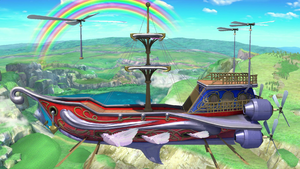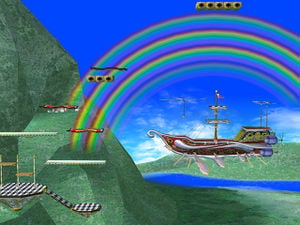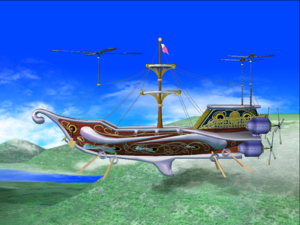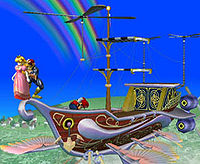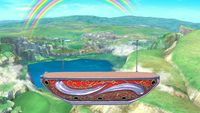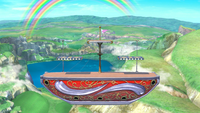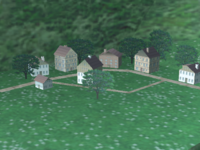Rainbow Cruise
| Super Mario 64 Mushroom Kingdom: Rainbow Cruise | |
|---|---|
Rainbow Cruise as it appears in Smash. | |
| Universe | Mario |
| Appears in | Melee Brawl Ultimate |
| Availability | Starter |
| Crate type | Presents |
| Maximum players | 4 (Melee and Brawl) 8 (Ultimate) |
| Article on Super Mario Wiki | Rainbow Ride |
Rainbow Cruise (レインボークルーズ, Rainbow Cruise), also known as Rainbow Ride, is a stage that appears in Super Smash Bros. Melee, Super Smash Bros. Brawl, and Super Smash Bros. Ultimate. It is based off the "Rainbow Ride" stage from Super Mario 64. It is also one of Mario's home stages, and it is his stage in All-Star Mode, along with any of his teammates, as well as Bowser's stage in All-Star Match 1 of Melee's Event Match.
Stage overview[edit]
The battle starts off on a flying ship that is facing left. The ship has seven propellers and six giant paddles, which make it fly. The anchor hangs off the bow. The ship is flat in the center, but not on the sides. The bow of the ship is just a bit higher than the deck. The stern is clearly higher than the rest of the ship, including the bow. It is wide enough to fit two characters. The stern increases the height of the back of the boat, which can help characters who can wall-grapple. In the middle of the boat is the mast of the ship. It has two levels to fight on. The space between the middle platform and the deck is slightly larger in comparison to the space between the top platform and the middle. The top platform is also shorter than the middle one. It is just large enough to fit Bowser. After about thirty seconds, the ship will crash into the next segment of the stage and sink. When the ship sinks, the characters will have to battle on the strange floating platforms that follow. The platforms are different and feature a rotating axle platform, flying carpets, and falling blocks. The stage moves in a clockwise order and at the end, downward-pointing arrows that flash red will appear. They indicate that all players should descend to the lower parts of the stage before the camera zooms down. Those who do not make it to the boat, which is waiting below, will be KO'd off the top off the screen. The cycle continues from there.
In Ultimate, any sections of the obstacle course which are beyond the camera bounds, even if they are within the blast zones, are intangible, preventing fighters from exploiting them for camping, or teching to avoid ceiling KOs.
Ω form and Battlefield form[edit]
In Super Smash Bros. Ultimate, the main platform of the Ω form and Battlefield form is the same size and shape as Final Destination, and the design is based on the flying ship of the regular form, such as the floor resembling the ship's deck and the walls resembling the ship's hull. In the Battlefield form, the top soft platform's design is based on the ones on the ship's mast, and the two bottom ones are based on the swinging platform of the regular form. The stage also does not scroll.
Hazards off[edit]
With stage hazards off, players will only fight on the flying ship as the stage never scrolls to the other areas.
Origin[edit]
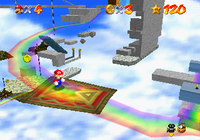
This stage is loosely based on the Rainbow Ride course, the fifteenth and final main course of Super Mario 64. It can be accessed via a high ledge to the right of the entrance of the Tick Tock Clock course in a small room.
The course is set in an area high above the clouds that features a rainbow motif. The course features a giant winged ship, which the player must reach in order to collect the Power Star located on the bow; magic carpets, a form of transportation exclusive to the course which transport the player to another part of the course by standing on it; seesaw-like platforms, which tilts to the side the player is on; a swinging pendulum platform; and Donut Blocks, a type of platform debuting in Super Mario Bros. 3 which can fall if the player stands on them for too long.
This stage features the elements from the Rainbow Ride course in Super Mario 64, albeit with some notable key differences. Most notably, the Rainbow Ride course is set in an area above the clouds, while the stage's background features a double rainbow arch and is set in an area below the clouds, surrounded by a mountain range with a lake in the middle. The giant winged boat has been scaled down and redesigned with two soft platforms above the main platform. The seesaw platforms and the swinging pendulum platforms have also been scaled down and redesigned for this stage.
This stage's name is the Japanese name for the Rainbow Ride course, which is also displayed in the level select in Super Mario 64's debug menu. The usage of "Rainbow Cruise" instead of "Rainbow Ride" in the North American version of Melee initially appeared to be an oversight by the localization team. PAL versions of Melee and Brawl named the stage "Rainbow Ride", and North American demos of Brawl also used "Rainbow Ride" before being changed for the final release; however, all English versions of Ultimate use "Rainbow Cruise", cementing it as the stage's name despite the localization difference.
Tournament legality[edit]
Rainbow Cruise was allowed in the past during the early stages of the Melee and Brawl metagames; although it was a scrolling stage, it had a predictable pattern and was thus allowed by many tournament organizers. However, it has now been almost universally banned in notable tournaments in both games. This is because the stage has ungrabbable ledges, disappearing platforms, and winding, non-linear passages throughout the entire cruise. This creates massive problems for characters with either poor to mediocre recoveries or slow and sluggish aerial maneuvering. The stage greatly favors characters with good air mobility and jumping ability, allowing some already top-tier characters to almost guarantee a win on this stage (such as Jigglypuff in Melee and Meta Knight in Brawl), and overcentralizes keeping up with the stage instead of actually fighting with the opponent. The abundance of alternative pathways through the stage can also promote stalling by allowing faster characters to avoid fighting altogether.
This stage was also unbanned as a one-off in Apex 2015 for the Salty Suite match between Ken vs. PC Chris. However, neither player counterpicked to this stage during that set.
Gallery[edit]
Super Smash Bros. Melee[edit]
Super Smash Bros. Brawl[edit]
Super Smash Bros. Ultimate[edit]
Three Isabelles using their up special on the stage in Ultimate.
Names in other languages[edit]
Trivia[edit]
- When stage hazards are disabled, the obstacle course can still be viewed with camera controls, although they are always offscreen during gameplay. It is not solid however.
- During the first part of the boat ride, it is possible to jump out of sight, onto a platform above the boat, avoiding the fights below. The only drawback is hoop damage. This was removed in Ultimate.
- It is possible to hack the camera and see a village settled on the other side of the mountains.
- It is impossible to fall through the magic carpets. The carpets also only rise diagonally upward to the right.
- In Melee, donut blocks were semi-soft platforms, meaning that they could be jumped through, but not dropped through. In Brawl, the donut blocks were changed to hard platforms, meaning characters can no longer pass through them in any way.
- In Melee, Kirby can up throw at the start on the ship and suicide KO off the top due to hitting higher parts of the level which appear later.
- In Melee, if Player 3 is either Donkey Kong or Bowser, they will spawn on the top platform instead of the middle when the match begins.[1]
- If Pokémon Trainer is used on this stage in Brawl, he will stand on a special magic carpet in the background that is otherwise not present. In Ultimate, he stands on a platform in the background.
- If one stands at the edge of the teeter totter (near the top of screen), one will not slide off when it tilts. Instead, the character will shake repeatedly until they jump off or when it disappears.[2]
- Warp Stars never appear on this stage. If the Warp Star is the only item turned on via Item Switch, all the crates and capsules that appear will be explosive or empty.
- This is the only starter Melee stage in Brawl not to return in either version of SSB4. It, Green Greens, Pokémon Stadium and Big Blue are also the only Melee stages present in Brawl but not either version of Smash 4.
- In Ultimate, the following Assist Trophies can only appear on the Battlefield and Omega forms of this stage: Chain Chomp, Thwomp, the Moon, Mother Brain, Kapp'n, Devil, Vince, Nikki, Yuri Kozukata, Arcade Bunny, and the Squid Sisters. Additionally, the following Poké Ball Pokémon can only appear on the Battlefield and Omega forms of this stage: Abra, Alolan Exeggutor, Lunala and Marshadow.
References[edit]
| Stages in Super Smash Bros. Melee | |
|---|---|
| Starter stages | Brinstar · Corneria · Fountain of Dreams · Great Bay · Green Greens · Icicle Mountain · Jungle Japes · Kongo Jungle · Mushroom Kingdom · Mute City · Onett · Pokémon Stadium · Princess Peach's Castle · Rainbow Cruise · Temple · Venom · Yoshi's Island · Yoshi's Story |
| Unlockable stages | Battlefield · Big Blue · Brinstar Depths · Final Destination · Flat Zone · Fourside · Mushroom Kingdom II · Poké Floats |
| Dream Land · Kongo Jungle · Yoshi's Island | |
